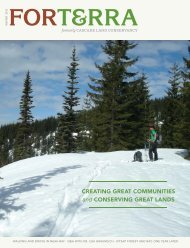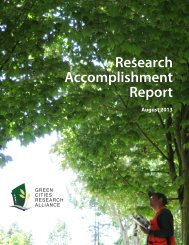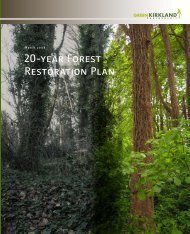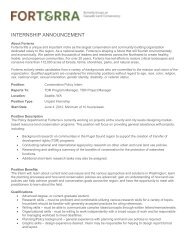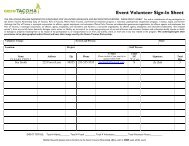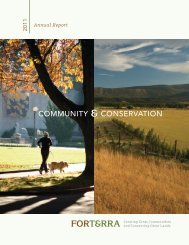Seattle'S ForeSt ecoSyStem ValueS - Forterra
Seattle'S ForeSt ecoSyStem ValueS - Forterra
Seattle'S ForeSt ecoSyStem ValueS - Forterra
Create successful ePaper yourself
Turn your PDF publications into a flip-book with our unique Google optimized e-Paper software.
Residential Building Energy Effects<br />
The urban forest moderates local climate, which can translate to reduced energy costs for homeowners. Depending on their<br />
size, proximity to a house, and whether they are evergreen or deciduous, trees can affect residential heating and cooling<br />
needs. Trees in urban areas can influence temperatures by providing evaporative cooling, acting as wind blocks, and offering<br />
shade.<br />
In Seattle, an estimated 1.6 million British thermal units (MBTU) of natural gas and 43,000 megawatt-hours<br />
(MWh) of electricity are saved annually because of the urban forest. This equates to roughly<br />
$5.9 million dollars in annual savings in Seattle.<br />
The energy estimates rely on field-collected data, including distance and direction from residential buildings, species, tree<br />
height, and building percent cover. Cost savings reflect statewide average prices per kWh and per MBTU, adjusted from 2002<br />
pricing. Energy savings from cooling and heating use a statewide estimate for energy costs, which likely means that the residential<br />
energy effects are high estimates for Seattle’s moderate climate.<br />
Because 88% of Seattle's energy is generated using hydroelectric power, this report does not include a value for avoided carbon<br />
emissions from fossil-fuel power generation, as is often provided by i-Tree Eco reports.<br />
16



